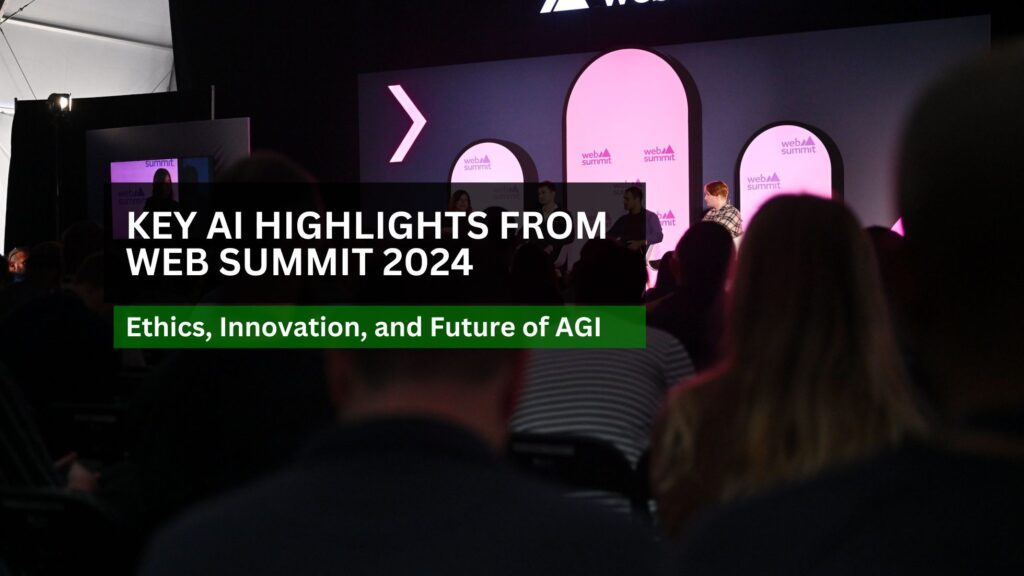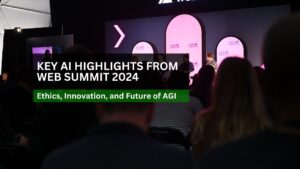Attending Web Summit 2024 in Lisbon highlighted the remarkable strides AI is making across industries, from cybersecurity and healthcare to content creation and automation. At Sapientai, I am well-versed in the dynamic advancements within AI, yet this summit provided a unique opportunity to exchange perspectives with thought leaders actively shaping the industry’s ethical and technological direction.
Highlights included powerful insights from experts like Max Tegmark and Thomas Wolf, who emphasized the pressing need to address the ethical stakes of open-source models and the profound impact of “Tool AI” — specialized AI designed to benefit society without the risks posed by AGI. Tegmark’s stance on AGI was compelling; he argued that while Tool AI can drive immense progress, AGI remains uncontrollable and poses risks we may not be prepared for.
Here are my key takeaways on AI’s trajectory, the potential it unlocks, and the ethical priorities we must address to responsibly harness its transformative power.
An Optimistic Future for AI: Max Tegmark’s Vision
One of the most energizing speakers was Max Tegmark, an MIT professor and renowned AI researcher, who took a refreshingly optimistic stance on the potential of AI. During his opening remarks with Thomas Wolf of Hugging Face, Tegmark addressed the risks of artificial general intelligence (AGI) but also urged us to focus on what he calls “Tool AI” — powerful, specialized systems designed to serve human needs without posing existential risks.
Tegmark’s message was clear: we’re not powerless bystanders waiting for AI to shape our future. Instead, we can actively choose to create technologies that are beneficial and safe.
Open-Source AI Models: Democratizing Access or Amplifying Risks?
A central theme of Web Summit 2024 was the debate on open-source AI models. Thomas Wolf of Hugging Face and Tegmark both argued for the importance of open-source AI in creating a more equitable tech landscape. Open-source, they suggested, democratizes AI, allowing more minds to collaborate and innovate on AI tools that can solve real-world problems. Tegmark emphasized that a closed, monopolized AI industry could lead to regulatory capture, where a few dominant companies dictate standards.
I see open-source AI as a double-edged sword. While it promotes inclusivity and innovation, it also raises questions about accountability. Striking the right balance between openness and control is critical, especially as we develop tools that could impact businesses and individuals worldwide.
The Race to AGI: A “Suicide Race” or an Opportunity?
Tegmark and Wolf both warned against viewing AGI as a necessary goal, highlighting that many of AI’s most promising applications don’t require AGI at all. From healthcare advancements to climate solutions, “Tool AI” can deliver immense benefits without the risks associated with creating human-level machine intelligence.
In one of the summit’s moments, Tegmark called the global race to AGI a “suicide race,” arguing that nations competing to create AGI would risk unleashing a technology they couldn’t control. He proposed an “AGI moratorium” treaty, similar to existing arms control agreements, to give humanity the chance to develop safe and effective guidelines.
This perspective aligns closely with Sapientai’s ethos. We’re focused on harnessing AI’s current potential to support business growth, drive innovation, and improve human life. We don’t see AGI as essential to achieving those goals. Instead, we’re concentrating on practical, impactful AI solutions that align with ethical considerations and client needs.
AI’s Transformative Potential in Life Sciences, Health, and Sustainability
The transformative impact of AI in healthcare and sustainability took center stage at Web Summit 2024, where leaders showcased its power to deliver real, tangible benefits. Jayme Strauss from Precision Neuroscience discussed breakthroughs in AI-powered neural implants that are helping patients regain control over motor functions, demonstrating AI’s profound potential to revolutionize medical treatment and improve quality of life.
Rita Nakazawa of NTT added a vital perspective on sustainability, emphasizing how AI could support global health systems by designing more resilient healthcare solutions that also reduce environmental impact. According to the 2023 McKinsey Global Institute report, AI could boost healthcare productivity by 20–30% within the next decade — a statistic that underscores the broad, life-enhancing potential AI brings to health and sustainability.
AI and Cybersecurity: Empowering Defenses or Exposing Vulnerabilities?
One of the most striking conversations centered on AI’s dual role in cybersecurity. Ann Irvine, Chief Data Officer at Resilience, highlighted how AI-powered tools enable cybercriminals to innovate faster, thus increasing the pressure on organizations to defend against increasingly sophisticated attacks. AI is indeed a game-changer, but it’s one with consequences that amplify human error as the weakest link in cybersecurity.
Building on this conversation, the potential threat of quantum hacking looms large. According to a recent analysis from TAG, quantum computers could soon possess the ability to break today’s encryption protocols, which would redefine cybersecurity risks on a global scale. Quantum hacking exploits AI-optimized quantum algorithms to decipher encryption keys exponentially faster than classical computers, posing a substantial threat to sensitive data and critical infrastructure. This “quantum threat” has pushed cybersecurity experts to accelerate the development of quantum-safe encryption. However, AI’s role in accelerating quantum-resistant algorithms and detecting these new types of threats is just as crucial.
This point aligns with broader insights from IBM’s 2024 Cybersecurity Threat Report, which warns that AI-enabled attacks are rapidly growing, from deepfakes used in social engineering to AI-driven malware. It’s clear to me that organizations, including ours, must stay proactive, educating teams about AI-enhanced phishing scams and adopting adaptive security protocols.
However, as AI redefines cybersecurity, the challenge remains in balancing its immense potential to protect with the sobering realization that it also arms adversaries with unprecedented tools. The stakes are high, and organizations must be relentless in creating safeguards against this double-edged sword.
Content Creation and Intellectual Property: The AI Wild West
As AI reshapes the content landscape, legal and ethical issues are mounting. Chris Caldwell, CEO of Concentrix, noted that AI now allows consumers to generate mass legal complaints, which disrupts the balance between user rights and corporate obligations. Shara Senderoff, CEO of Jen, went even further, calling the music industry’s adoption of generative AI a “lawless space” where intellectual property protections lag far behind innovation.
From my perspective and my experience with JLJ Digital, AI-driven content creation holds incredible promise, but companies and legislators need to step up. The risk is that without legal clarity, creators and innovators could find themselves in an IP wasteland. AI companies should invest in ethical AI that respects creative integrity and acknowledges the role of human artists, because without it, we risk eroding trust in AI’s role within the creative economy. This “Wild West” atmosphere won’t stabilize until we establish robust legal and ethical standards to protect intellectual property rights.
Democratizing Creativity: AI’s Role in the Artistic Process
I was particularly intrigued by Hovhannes Avoyan’s insights from Picsart, who believes that AI can democratize creativity by lowering entry barriers. This view aligns with Adobe’s 2024 Creativity and AI Study, which found that 72% of new digital artists credited AI tools with helping them enter the field.
While we at Sapientai.io embrace the empowering potential of AI-driven tools, I echo the caution of Jack Conte from Patreon, who warns of the risks in unregulated AI content. AI can certainly democratize creativity, but without ethical standards, it can also flood markets with unoriginal work, diluting genuine talent. In my view, AI should complement, not replace, the creative mind.
Automation and AI in the Workforce: Redefining Jobs
AI-powered robots and automation are no longer a vision for the distant future. Peggy Johnson, CEO of Agility Robotics, described humanoid robots designed to handle repetitive tasks, allowing humans to focus on more fulfilling, innovative roles. This aligns with the findings of the World Economic Forum’s 2023 Future of Jobs Report, which suggests that AI will transform rather than replace human roles, with automation projected to create 12 million new jobs by 2025.
From my perspective, this shift could be a win-win, with AI taking on monotonous tasks and opening up opportunities for upskilling and creative work. However, it’s essential that industries implement this responsibly, ensuring the workforce is prepared and supported through the transition.
Data Ethics, Privacy, and the Societal Impact of AI
Another recurring theme was the need for transparency, trust, and equitable impact in AI. Tea Mustac from Spirit Legal and Don McGuire from Qualcomm emphasized that ethical data use is crucial to building public trust in AI, with research from the Pew Research Center confirming that transparency in data handling greatly influences public perception of AI.
Equally important was the focus on AI’s societal impact. Emilia Javorsky from the Future of Life Institute highlighted concerns about the “AI advantage gap,” where the benefits of AI are concentrated among large tech firms, potentially excluding smaller players and the general public. Studies from Stanford’s Human-Centered AI Institute support this, showing that AI investments largely favor major corporations.
At Sapientai, we believe AI should serve society as a whole, not just a privileged few. Our mission is to create AI solutions that are fair, accessible, and beneficial across industries, prioritizing privacy and ethical data use to build trust with users. By championing user-centric designs and broadening access, we strive to prevent a tech-driven divide and ensure AI’s advancements deliver meaningful, equitable impact for all.
Europe’s Role in AI Innovation: A Need for Acceleration
Marjut Falkstedt, from the European Investment Fund, called on Europe to convert its deep AI expertise into startups capable of global competition. This is a valid call; Europe has all the ingredients for a robust AI ecosystem but lacks the startup culture of the U.S. and China. According to OECD’s AI Policy Observatory, European countries are still underrepresented in AI unicorns, largely due to funding gaps and regulatory constraints.
As we expand Sapientai’s reach, I’m reminded of the untapped potential within Europe’s AI talent pool. The continent’s regulatory frameworks are among the most ethical, but without agile support for startups, Europe risks falling further behind. Supporting innovation through funding and incubators is essential if Europe is to claim its place in the global AI landscape.
Final Notes
Web Summit 2024 reinforced the need for responsible AI development that drives real impact. Across cybersecurity, healthcare, and creative fields, AI’s potential was on full display. Leaders like Max Tegmark and Thomas Wolf emphasized the importance of open-source models, ethical safeguards, and the practical benefits of “Tool AI” powerful, targeted applications that avoid the uncontrollable risks of AGI.
The summit also highlighted AI’s transformative role in healthcare and sustainability, showing how it can improve lives and protect the environment. But as these technologies evolve, privacy and ethical standards must remain at the forefront — principles we prioritize at Sapientai.
As we expand in Europe’s AI landscape, we’re committed to developing solutions that advance technology and serve society’s broader interests. Web Summit was a reminder of our mission to shape AI responsibly, creating tools that solve real challenges while maintaining high standards of trust and transparency.





